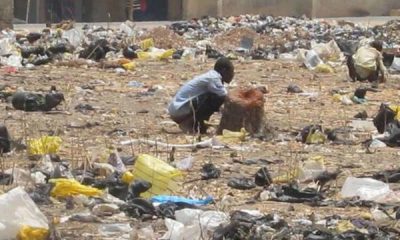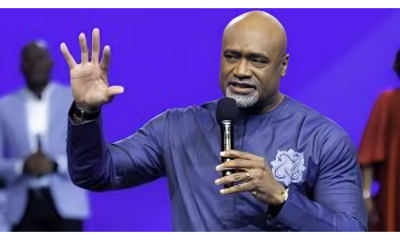NEWS
News Analysis: Why Govt., Citizens must say no to Illegal Abortion – Stakeholders

Stakeholders, including clerics, parents and youths, have called on Nigerians and governments at all levels to say no to illegal abortion and its funding.
The stakeholders made the call while speaking with the Newsmen in separate interviews in Ibadan on Tuesday.
Most Rev.
Emmanuel Badejo, President, Pan African Episcopal Committee for Communications for The Bishops of Africa (CEPACS), says in every abortion, human life is terminated.According to Badejo, who is also the Catholic Bishop of Oyo Diocese, abortion is a crime and can never be a constitutional or human right.
“In fact, I call abortion a ‘constitutional wrong’; one can only see insensitivity in any leader or government that funds abortion in Nigeria or in Africa.
“It must either be that such government or leader is completely disconnected from the reality or that powerful interests benefiting from the crime are pushing such government or leaders.
“Our cultures and religions support life, not killing.
“Africa and Nigeria need funding for education, good infrastructure, good healthcare and jobs. To starve these critical areas, which improve the quality of life, of funds and then fund abortion can only be wicked and evil.
“The striking down of the 50-year-old ‘Roe and Wade’ in the United States of America has energised the pro-life movement all over the world. More importantly, it has reversed a grave institutionalised injustice and crime against humanity.
“Human life is equally sacred, but millions of children have already been murdered under the law. May they rest in peace and may God have mercy,” he said.
Badejo remarked that women needed to be taught that pregnancy was not a disease and the unborn baby not an aggressor.
He added that women deserved to be given good education, good health services and employment.
According to him, maternal health should be given priority, along with sincere and counselling services, including information on how to put children up for adoption or welfare.
“Even now, many credible people will like to adopt children, but are not able to. Women who cannot support the children they have conceived need this kind of support, not abortion.
“They need to know that there is no such thing as safe abortion. It is certainly never safe for the baby or for the prospective mother who suffers great trauma, a huge sense of guilt and medical complications that follow.
“These risks have to be revealed to women in a sincere way. It is the pharmaceutical companies and unscrupulous medical personnel who gain from abortion.
“Parents should actually parent their children. They should be alert and resist whatever can ruin the lives of their wards. Youths should also be taught and encouraged to live disciplined and morally-upright lives,” he said.
The Catholic bishop said that a country like Nigeria, with majority Christian and Muslim population, should not be seen to accommodate abortion, which neither of the two religions support.
“Religious institutions and stakeholders should live up to their moral responsibilities by working for a morally- upright society. We all are stakeholders in building such a society. We all will benefit from it,” Badejo said.
To Bishop of Ibadan Anglican Diocese, Most Rev. Joseph Akinfenwa, abortion is wrong, adding that sanctity of life must be maintained.
Akinfenwa said that women in developing countries, such as Nigeria, could be helped through empowerment, education and enlightenment.
He stressed the need for the people, including parents, to take sex education very seriously, explaining, however, that sex should be for married couples, while pre-marital sex should be discouraged.
“Also, religious leaders should always preach the fear of God, to constant remind people to respect life, which only Him can give.
“We should learn to preserve life, so as to avoid the wrath of God,” he said.
Similarly, Very Rev. Olayinka Akande, Presbyter, Methodist Cathedral, Agbeni, Ibadan, noted that the Bible consistently proclaims the utmost importance of protecting life in the womb.
This portrayal, he said, could be found in both the Old Testament and New Testament, especially in Psalms 51 and139; even in the life of Jesus, while resting in Mary’s womb as found in Luke 1.
According to him, in Jeremiah 1:4-5 and Isaiah 49:1b, God clearly emphasises the value of life in the womb and His compassionate care for the pre-born.
“Both passages are similar, as each prophet reflects on his call from heaven. Jeremiah and Isaiah consistently heard from the Lord and were used as mouthpieces to His people.
“They both had long lasting personal relationship with God and claimed they were appointed to complete kingdom work while in the womb.
“So, from God’s perspective, there is no barrier between pre-natal and post-natal life. God sees life from the moment of conception,” he said.
Akande said that the Biblical idea that God could form personal relationships with His people in the womb was another evidence that pre-born children possessed full personhood.
The Methodist cleric said that from both the earthly and Biblical points of view, anti-abortion, and not abortion, should be legalised.
Meanwhile, an elderly man, Mr Francis Oghuma, described the attempt to fund illegal abortion as funding and fuelling illicit sex, prostitution and related vices at all levels.
“Africa is a place of values; it is exceptional. So illegally funding abortion hereto is not an African style. It must, therefore, be seen as absurd and criminal.
“Overturning the Roe v Wade is necessary, because it would have further deteriorated family ties, partners’ trust and promise, sexual abuses, while reducing pregnancy to naught.
“The impact of its overturn is further making abortion illegal and strengthening reproduction integrity and values,” he said.
Oghuma said that rather than funding or legalising abortion, continuous amendment of rights of women at all facets of the polity was germane.
He advocated for women and mothers’ empowerment, social security, welfarism for under-age children and maternal care.
Oghuma advised governments, religious leaders, parents and concerned stakeholders to ensure that sexual relationship and intimacy remained sacred.
“The major cause of abortion is projection or inability to cater for children and non-acceptability of unwanted pregnancy as well as stigmatisation of same in a society, which regards them as bastards.
“So, there is the need for sensitisation on a child’s right to live.
Also, Mrs Grace Olubunmi, while affirming that abortion should not be legalised, advised both the married and singles to curb illicit sex.
According to Olubunmi, the foetus or embryo has the right to live.
“God wants humans to multiply, but through lawful or legalised union.
“We cannot, because of incest and rape, legalise abortion. Rather, its prevention should be legalised.
“Lots of talents and great presidents of nations will end up being victims of abortion, if it is legalised,” she said.
News men reports that the case is not different for the youth.
One of them, Miss Surprise Omolara, said abortion should not be legalised, because of its many negative effects, such as causing premature deaths and damage to wombs.
“Sometimes ago, I heard that a bill was passed concerning illegal abortion. I was happy with the move, because the fear of going to jail will make youths to desist from having premature sex. Even if they must do it, it will be with protection.
“Many people are now regretting due to the abortion they did in the past. If eventually they escaped death, they might now be battling with infection or inability to conceive due to the use of quack doctors or unsterilised equipment.
“Prostitution will also reduce if abortion is eradicated, because if they start getting pregnant without means of aborting it, the shame will make others to stop such practice,” she said.
News men recalls that IPAS, an international non-profit advocacy group, seeking to improve and expand women’s sexual and reproductive rights, recently disclosed that despite Nigeria’s restrictive abortion law, over two million abortions occur annually.
“The Abortion Law in the country permits abortion, only to save a woman’s life, making it restrictive and inaccessible to many women.
“The fact that abortion is legally restrictive in the country has not stopped the large number of abortion procedures.
“Many women end up in the hands of quacks; some die in the process, while many are permanently maimed due to unsafe abortion.
“To quote a past President of International Federation of Obstetricians and Gynaecologists, our women are not dying, because of untreatable diseases, but they are dying because the society has yet to make the decision that their lives are worth saving,” the Country Director of IPAS, Mr Lucky Palmer, had said. (NAN)
NEWS
DHQ Rebuts Allegation of Internal Sabotage in Benue Massacre

The Defence Headquarters (DHQ) has dismissed the allegation suggesting that internal sabotage within the Nigerian military contributed to the tragic events in Yelwata, Benue.The Director of Defence Information, Brig.-Gen. Tukur Gusau, in a statement on Tuesday, said the claims were unfounded and not supported by credible evidence.
Gusau said the Nigerian military had consistently denied any involvement in the massacre. According to him, the Chief of Defence Staff (CDS), Gen. Christopher Musa, has publicly stated that the military was not responsible for the killings in Yelwata.“Furthermore, the Nigerian Military has emphasized its commitment to protecting civilians and upholding the rule of law.“There is no credible evidence to substantiate claims of internal sabotage within the military related to the Yelwata incident.“Investigations by independent bodies, including human rights organizations, have not found any links between the military and the perpetrators of the massacre.“The violence in Yelwata is part of a broader pattern of intercommunal clashes in Nigeria’s Middle Belt region, primarily between farmers and herders.“These conflicts are driven by longstanding disputes over land and grazing rights, ethnic tensions, and competition for resources,” he said.Gusau said that while the military had been deployed to maintain peace, the root causes of the violence lied in complex socio-economic and political factors.He added that attributing the Yelwata massacre to internal sabotage within the Nigerian military was misleading and detracts from the real issues at play.According to him, it is essential to focus on addressing the underlying causes of intercommunal violence and to support efforts aimed at fostering dialogue, reconciliation, and sustainable peace in the affected regions.“The CDS has only called for a holistic approach and the need for the cummunities and the security agencies to work closer to address the issue.“He also call on the communities not to hide criminals and also assure them the military ans other security agencies are there to protect lives and properties of law abiding citizens,” he added. (NAN)NEWS
Benue killing: NAF Deploys More Air Assets in Op Whirl Stroke

As part of sustained efforts to restore peace and stability across the North Central region, the Nigerian Air Force (NAF) has deployed additional air assets under Operation Whirl Stroke (OPWS).This is contained in a statement by the Director, Public Relations and Information, NAF, Air Commodore Ehimen Ejodame, on Tuesday in Abuja.
Ejodame said the strategic move had reinforced the NAF’s commitment to enhancing security, supporting ground operations, and reassuring communities affected by banditry, kidnapping, and communal unrest. He said the Chief of the Air Staff (CAS), Air Marshal Hasan Abubakar, conducted a firsthand evaluation of air operations under OPWS, to assess the effectiveness of these expanded efforts.According to him, the visit included a high-level strategic engagement held on Tuesday, at the Headquarters Tactical Air Command, Makurdi.Ejodame said the Chief of Army Staff, Lt.-Gen. Olufemi Oluyede; a representative of the Chief of the Naval Staff, Rear Adm. Olusegun Ferreira; the Commander of OPWS; and the Maritime and Air Component Commanders, alongside other key stakeholders, were part of the meeting.According to Ejodame, critical updates were provided on the current tempo of joint operations aimed at restoring lasting peace across the region.In his remarks, the CAS revealed that the newly deployed air assets had been successfully integrated into ongoing operations, delivering real-time intelligence and precision targeting support.He stated NAF aircraft had continued to conduct surveillance, armed reconnaissance, close air support, and precision strike missions with remarkable success.Abubakar noted that the current deployment aligns with the Federal Government’s overarching mission to stabilise the Middle Belt region.He highlighted the impact of recent coordinated air and ground operations across Benue, Nasarawa, and Taraba States, which have led to the dismantling of several militia camps, bandit enclaves, and criminal hideouts.“These outcomes reinforce our unwavering commitment to protecting innocent lives and supporting national peace-building initiatives.“As long as peace is threatened, our resolve remains unshaken.“The NAF will continue to deliver timely, decisive air support in synergy with sister services, ensuring the protection of lives and properties while advancing our mission of restoring peace to the Middle Belt and beyond,” he said.The Service Chiefs jointly emphasised the importance of synergy among the armed forces and other security agencies, noting that jointness remains a cornerstone for operational success under Operation Whirl Stroke.They reiterated that the ongoing operations are part of a broader goal to create a secure environment where residents can live and conduct their legitimate activities without fear. (NAN)NEWS
Tinubu Reiterates Commitment to Fast-Track Approvals for Viable Projects

President Bola Tinubu, on Tuesday restated the determination of his administration to fast-track approvals for viable infrastructural projects in the country.Tinubu, represented by Vice President Kashim Shettima, made this known at the 2025 Nigeria Public-Private Partnership (PPP) Summit on Tuesday in Abuja.
The president therefore urged private sector partner to be focused and more committed. According to him, what matters to the average Nigerian is the availability of basic infrastructure such as power, roads, health facilities and quality schools. He called for a more strengthened public-private sector partnership that emphasises innovation, efficiency, commitment and integrity above mere capital and investments.” We need more than investment. We need innovation, we need efficiency, and above all, we need integrity.” I urge you to look beyond the risks and recognise the immense opportunity to shape a nation that is not just rising, but ready.“The projects that emerge from this summit must not gather dust on paper or linger in bureaucratic limbo.” We will fast-track approvals for viable projects. We will ensure coordination across Ministries, Departments, and Agencies to enable swift implementation.“We do this because we know that what matters to the average Nigerian is not promises, but power in their homes, roads to their farms, access to clean water, modern hospitals, and quality schools. We must build.” We must deliver. And we must do it together,” he said.He observed that a 21st-century economy cannot be built on 20th-century infrastructure, pointing out that the “old model of public-only infrastructure funding is no longer sustainable.“Our national aspirations far exceed what public budgets alone can deliver. That is why we must innovate, and why we must work together.” We are not looking for investors to carry burdens. We are offering opportunities to create value.” We seek long-term partners who are ready to help us bridge our infrastructure gap with purpose and precision,” he added.Tinubu recalled that his administration, on assumption of office two years ago, was quite aware “that a functional relationship between the public and private sectors would be the magic wand of transformation.”He reaffirmed that the administration was still fully committed to that very public-private partnership that is passionate about delivering sustainable and inclusive infrastructure.” We have strengthened the Infrastructure Concession Regulatory Commission and enhanced its capacity to regulate, superintend, and de-risk PPP transactions.” We are determined to deliver infrastructure that is both sustainable and inclusive. Our economic reforms have laid a stable foundation.” From the removal of unsustainable subsidies to the liberalisation of the foreign exchange regime and the optimisation of government revenues, we have acted boldly and responsibly.“We are streamlining bureaucratic bottlenecks and improving transparency in our project pipelines.” We have aligned our processes with global best practices and investor expectations.”The President urged participants to ensure the event is “remembered not for fine speeches, but for bankable projects, signed deals, and enduring progress.”The Minister of Interior, Mr Tunji Ojo, commended the ICRC for championing game-changing projects across diverse sectors.Ojo noted that with President Tinubu and Vice-President Shettima in the saddle, Nigeria is taking its rightful place in the comity of nations.The Regional Director, Central Africa and Anglophone West Africa, IFC, Dahlia Khalifa, applauded the ongoing reform in Nigeria’s PPP framework.Khalifa acknowledged IFC’s collaboration with authorities across key sectors to achieve the country’s overall objectives and strengthening the existing relationship between the organisation and Nigeria.She added that Nigeria under President Tinubu has demonstrated strong commitments to timely and transparent resolution of disputes arising from PPP projects.Solomon Quaynor, the Vice President for Private Sector, Infrastructure and Industrialisation at the African Development Bank, said the theme of the summit implies that partnerships are not just optional but are essential.He said the infrastructure deficits “demand that the government and the private sector work together in commercially viable PPPs.”Quaynor added that the bank was working with other partners on the Lagos-Abidjan highway project to boost regional economic integration in West Africa.“PPPs are complex long-term projects. They need to be designed properly and designed to survive different political administrations because by their very nature, they are long-term,” he stated. (NAN)





























